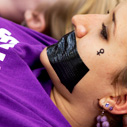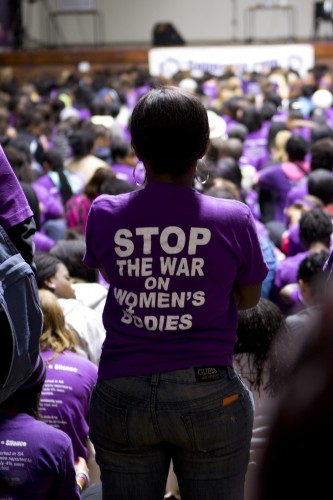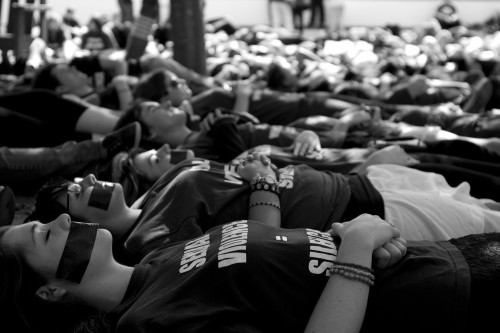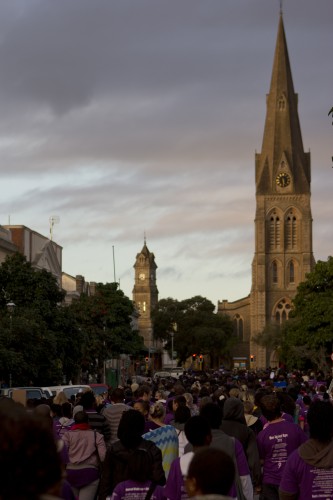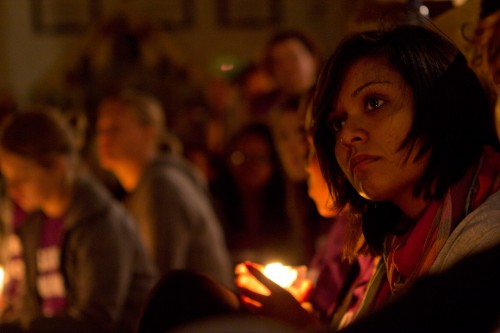Last year I missed the One in Nine march. Rhodes University does it every year, as a protest against the truly medievil levels of rape and violence directed at South African women. The name derives from the estimate that up to one in every nine rapes in the country goes unreported. The activist fringe even claims that a woman in South Africa is more likely to be raped than she is likely to learn to read. This year, I was around. So I signed up and went along to take photographs and try to be useful.
It’s six-thirty in the morning, and the crowd in the assembly hall is chatty. I feel nervous though, and find myself wondering why. I suspect that it’s because I am a man, and men – as a class – are precisely the group responsible for most of the rapes in South Africa. And – depending on your politics – for the environment that keeps it unpunished.
Lining up at a steel trestle table, I get my purple shirt with a message of solidarity on the front. The people and noise in the hall grows. A man to my left is discussing fasting with a girl in a circle of friends nearby. It’s the last time the women will get to talk or eat until later in the day. They are all getting black tape over their mouths in a few minutes. To remind the world of what it loses when a woman is raped.
“Rape limits human potential”, says a flyer on the table. Really – it’s necessary to say that?
Different stories as people collect together in familiar groups. Small ones and large ones. There is a woman sitting alone in the far back corner of the hall, watching the proceedings alone. I wonder what her story is.
Some people are wearing different purple shirts. They say “Rape Survivor” on the front. That’s courage.
As the group files out and begins marching down the road for the morning procession, the early-morning tiredness gives way to protest singing. There is a power to singing in this country that isn’t the same elsewhere. People sang on the way to toppling a government in South Africa. Someone starts a chant “One rapist, one bullet”. It’s hard not to sympathise with the protestors’ anger, but my stomach knots a little at the race politics that the song is playing off.
Someone takes their tape off to readjust it. There is an embarrassed smile underneath. That’s what we are losing today.
One of the taped protestors asks her friend to take a picture via a series of mumbles and handing over of a camera. The friend, untaped, ushers them into a pose together. “Can you look more miserable?” she asks. Everyone sags their faces. The camera beeps. Everyone unsags.
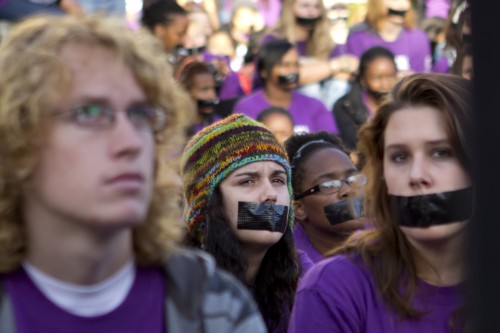
In silence for a day. Statistically, for every one rape the South African justice system hears about, eight more go unreported.
I start too notice that many of the men marching in untaped solidarity have become very quiet. Some gesture to the women with handsigns, or speak in whispers. It’s funny that as the women have gone quiet, so has everyone else. There’s a metaphor in there somewhere. I make a note of it in my book. I’ll work the finer point out later.
Assembled at the university’s main administration building, it’s time for a group photograph. Then a short speech outlining the day’s activities. There will be a die-in at the library at lunchtime, where everyone will lie down for two hours in front of the building to symbolise the women raped and murdered in South Africa. Over fifteen hundred bodies we will be. The organiser, Larissa, addresses the crowd one last time. Bald and tattooed, she looks hard as rock. Terrifying. “If it wasn’t for you, we wouldn’t be here today”, she tells the crowd.
Not perhaps the best choice of words, but it’s clear how it’s intended. In silence, there is a peculiar sense of will gaining momentum between the purple shirts and the black tape.
It’s 2pm and I arrive at the die-in. There are hundreds of people already lying prone across the floor, and more arriving as lectures end. A platoon of what I assume are photojourn students from the journalism department step gingerly between the bodies taking photographs. One of them climbs up a tree for a better view. Someone else is holding an expensive SLR like an idiot.
A siren sounds and Larissa addresses the lying crowd, now spread well across the entire library quad. Close to me, a woman somewhere is telling her friend that it took two years for her to work up the courage to wear a Rape Survivor shirt. This is her first protest as a declared survivor.
My digsmate Michelle has come to watch the die-in. She tells me how a student told a taped protestor last year that it would be easier to rape her now that she had tape over her mouth. Another told a protestor that since she has been raped once, what difference would another raping make. Unluckily, she had a camera on her and the fucker was identified and taken to a disciplinary hearing.
I feel thoroughly deflated. That’s the word I wrote in my notepad. Deflated.
As the protestors lie in silence, various invited speakers give increasingly personal and impassioned speeches to the group. I can feel the magnitude of what is passing from speaker to protestors, and one to another between them. It’s a curious feeling, being made to emotionally confront a world that society says has nothing to do with you. Which is just a women’s issue. That’s a crap distinction. People should be made to confront the world emotionally more often, I reckon.
A second horn sounds and the die-in is over. The protestors will head back to class until the evening assembly outside the admin building. They are still taped and will remain so until tonight. Nearby, a girl gets up, hugs the boy next to her and starts to cry. Jerking mumbles through the thick black tape. I realise she isn’t the only one. I feel thoroughly deflated. That’s the word I wrote in my notepad. Deflated.
Like my heart just… sort of imploded quietly into darkness.
It’s late afternoon and I arrive at the admin building to watch the purple and black crowd gathering. Purple and black. Hmm. I make a note to explore that metaphor. Some protestors have made posters expressing varying degrees of anger. One is holding hers upside down. It takes a few seconds of mumbling and handsigns for her friend to explain that it needs to be rotated. Giggles.
Michelle appears again. This time in a Rape Survivor shirt. It’s taken a huge expense of will for her to declare that. It’s been torturing her all day to stand on the periphery of something she feels so strongly a part of. I’m proud of her for having the courage to step inside the army of purple women. God, it must have been difficult.
Everyone marches down the high street to the church. There the tape will be removed, voices regained and the night reclaimed.
Inside the church there are speeches. Someone quotes something from the bible at length. Then a letter is read out from a woman who attended this protest last year. Someone who is in a dark place and hoping that time will really prove itself able to draw the cramping poison from what happened to her. Repair the wounds. Or at least have the mercy to numb them.
Someone speaks out from the podium to the men of South Africa. “I don’t think women are asking for anything special”, she says, “I think they are asking to be treated as human beings.” I’m angry that in a twenty first century liberal democracy it is actually fucking necessary to stand up and shout that rape is wrong.
The microphone is left open if anyone would like to address the protestors.
Nobody comes. At first.
One woman makes her way to the front. She introduces herself as a rape survivor from the Limpopo province. When she signed up for the protest, she originally ticked the box for the ‘rape survivor’ shirt. Then backed out. Crying, she recounts being raped by a family member until she was six.
Another woman. She had a friend who was raped in high school, and was the only person that friend ever confided to about it. She lived with that friend’s confession for years and never had the courage to bring it up with her again. Today, she tells the protestors, she realised that it’s never to late to speak up. To reach out.
Two people she passed today laughed at the tape on her mouth. One of them said the tape looked cute.
Another woman. She is too small to reach the microphone. Giggles. Someone brings a stand and puts it nearby. She recounts seeing her mother raped when she was younger. Her mom was working late, and after arriving home, her dad beat her and raped her in front of the girl. The was seven at the time. Her mom was the reason she came on the march today. She wishes that her mom had had the support that these taped, purple women have had today.
People are starting to cry right across the audience now. I’ve put my camera away. I’m not here to take photos of victims. And if that makes me a bad journalist, then I can live with that.
Another woman. Two people she passed today laughed at the tape on her mouth. One of them said the tape looked cute.
It’s not cute. It’s not fucking cute at all.
Another woman. She is the officer on the Student Representative Council in charge of transformation. After her election, she went out to celebrate and a friend tried to rape her. When she told those close to her, too many had similar stories. One explained, “that’s just how guys are.” So she told her mom. But her mom got mad with her. So they never talked about it again. Ever.
Another woman. When she was fifteen, her cousin raped her. In her own bedroom. In her own house. She never thought the day would come that she stopped blaming herself for it. Because she had never had anyone to hold her. To tell her that it was OK. That could she speak about it. Today she realised that she can find help. That things can be alright again, one day.
No more women. Not because there aren’t stories, but because there’s no more time. I try not to imagine the histories still in the audience, circulating an inch behind speech for a catharsis that has just passed.
I don’t regret not taking pictures of people crying. Yes there are tears, but there is also an immense strength. A solidarity. Cameras can only ever show tears. Strength and solidarity don’t fix so well to the sensor. The photographs would lie, so I won’t take them.
The priest closes with a prayer, and we move out into the night. It’s as dark as it always is, but the singing of untaped voices travels far into the streets.
For a complete gallery of images, click here. They are free for use if it’s to help this cause.

